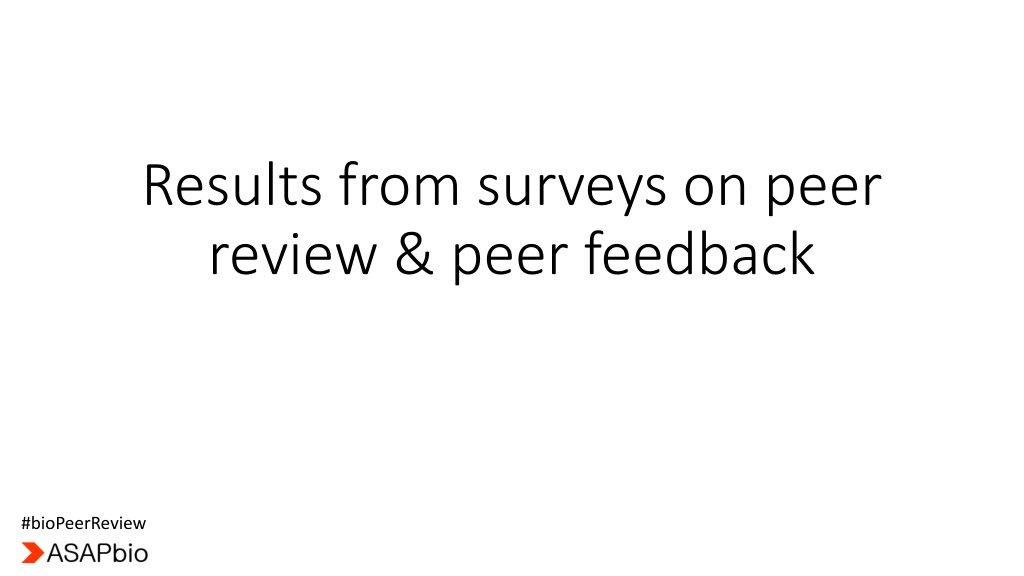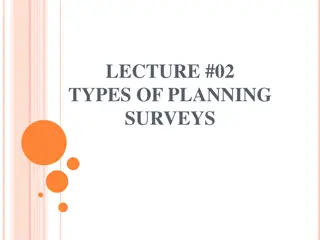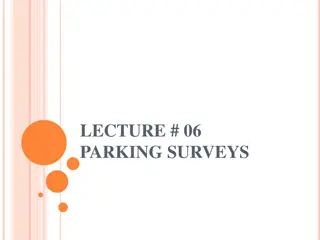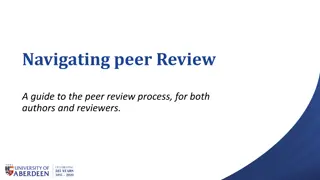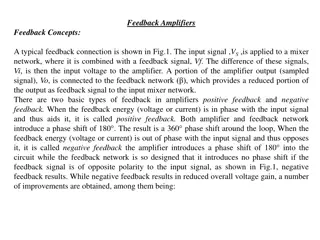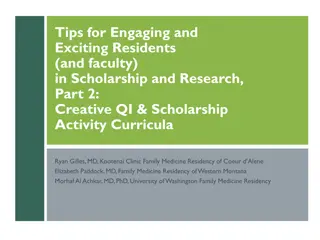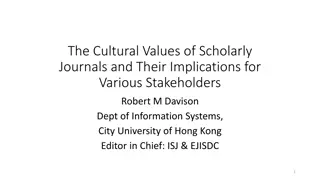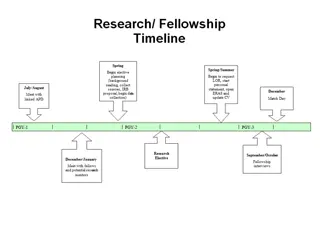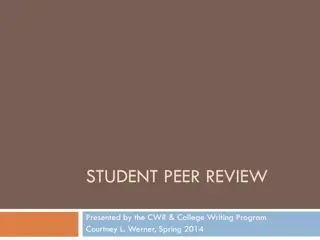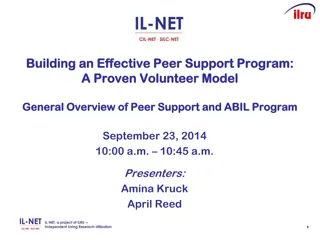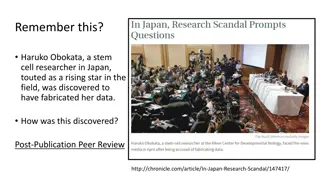Insights from Surveys on Peer Review & Peer Feedback in Scholarly Communication
Results from surveys on peer review and peer feedback provide valuable insights into the demographics, general attitudes, and major challenges faced in scholarly communication. The data reveals respondent demographics, overall satisfaction with peer review systems, and prevalent problems in current peer review practices, shedding light on areas for improvement.
Download Presentation

Please find below an Image/Link to download the presentation.
The content on the website is provided AS IS for your information and personal use only. It may not be sold, licensed, or shared on other websites without obtaining consent from the author. Download presentation by click this link. If you encounter any issues during the download, it is possible that the publisher has removed the file from their server.
E N D
Presentation Transcript
Results from surveys on peer review & peer feedback #bioPeerReview
Peer review survey demographics 295 responses total Where do you work? Sector (please check all that apply) What title best describes your position? Africa 0% Oceania 4% Asia 3% South America 4% 250 200 150 100 Other 15% North America 46% 50 Publisher 5% 0 Faculty member 36% Europe 43% Editor 11% Field (please check all that apply) Funder 7% In which scholarly communication roles do you have experience? (please check all that apply) 300 Postdoc 21% 250 Graduate Student 5% 200 300 250 150 200 150 100 100 50 50 0 0 #bioPeerReview Life Physical sciences Social sciences sciences
General attitudes toward peer review Overall, how satisfied are you with the peer review system used by scholarly journals? Don't know 1% Very Satisfied 1% Very dissatisfied 8% Satisfied 26% Dissatisfied 37% Neither satisfied nor dissatisfied 27% Ross-Hellauer T, Deppe A, Schmidt B (2017) Survey on open peer review: Attitudes and experience amongst editors, authors and reviewers. PLOS ONE 12(12): e0189311. https://doi.org/10.1371/journal.pone.0189311 #bioPeerReview
In your view, what are the major problems with the current peer review of manuscripts in the life sciences, in general? (# of responses) Peer reviewers are not trained to provide constructive reviews (282) Reviewing the same manuscript at different journals wastes effort (280) Peer reviewers use information unethically (improper sharing of manuscripts, Peer reviewers receive insufficient credit/recognition/reward (282) Difficult to find good reviewers/too many requests to peer review) (282) Too few reviewers look at each paper (281) Too few decisions are left to the editor (275) Too many decisions are left to the editor (277) Authors have too little control in selecting reviewers (279) Authors have too much control in selecting reviewers (279) Peer reviewers are personally biased for/against authors (284) Peer reviewers are systematically biased for/against authors (by institution, Peer reviews are of low quality (278) Peer reviewers ask for unreasonable experiments (284) Peer reviewers are pressured to work too quickly (279) Peer review takes too long (281) #bioPeerReview 0 0.2 0.4 0.6 0.8 1 Major problem Minor problem Not a problem Don't know
Do you have personal experience of the following types of peer review in various roles? (please check all that apply) The following types of peer review should be more widely used. (# of responses) Journal peer review transfer (282) Post publication peer review (282) Open platforms (280) Open final-version commenting (280) Commenting on preprints (282) Open pre-review manuscripts (282) Open interaction (284) Open participation(285) Open identity (285) Open reports (285) 0 100 Reviewer 200 300 400 0 0.2 0.4 0.6 0.8 1 Author Editor Publisher Reader None Strongly agree Agree Neutral Disagree Strongly disagree Don't know #bioPeerReview
Reviewers of a manuscript should be expected to review the following components: Novelty of the manuscript Importance of the manuscript Each figure/table Interpretation of data Scientific soundness Ethics Code Datasets Statistics 0 50 100 150 200 250 #bioPeerReview Strongly agree Agree Neutral Disagree Strongly disagree Don't know
Credit and training for peer review Researchers are adequately trained in how to perform effective peer review. Should a researcher s peer reviewing activity be taken into consideration when they are evaluated for grants, jobs or promotions? Should scientists receive monetary compensation for peer review? Strongly agree Agree Would you accept $200 as compensation for reviewing a manuscript? Neutral Disagree If a student or postdoc participates in peer review, should they be identified as a peer reviewer to the editor? Strongly disagree Don't know 1% 3% Don't know 11% Yes 9% 15% No 9% Don't know 25% Yes 29% No, this is too much compensation 19% Don't know 7% No, this is not enough compensation No 5% 53% Other (mostly summarized as "no") Yes 80% No 46% 1% 16% Yes 88% 13% 70% #bioPeerReview From Peer Feedback survey
Efficiency in peer review For your most recent published paper, how many different journals did you submit it to (including the one it was published in)? For your most recent published paper, how many rounds of peer review did the manuscript go through? To how many different journals did you submit your last published paper, including the one where it was published? (fraction of 357 responses) 0.45 140 140 127 0.4 120 120 118 0.35 100 100 0.3 80 80 0.25 67 0.2 60 60 55 51 0.15 40 40 40 0.1 20 20 19 0.05 12 11 5 4 3 3 2 2 1 1 1 1 1 0 0 0 0 0 0 0 1 2 3 4 5 6 7 8 9 10 11 12 1 2 3 4 5 6 7 8 9 10 11 12 1 2 3 4 5 6 7 8 9 From Peer Feedback survey Peer Review survey #bioPeerReview
Peer Feedback survey demographics 370 responses total I'm a(n) I primarily work in My field can be described as (check all that apply) (Top responses only - note that computational sciences were not a default option) Technician 1% Staff Scientist 7% Undergraduate 0% Africa 0% Oceania 2% South America 3% Asia 6% Graduate Student 19% Senior faculty 19% Ecology Immunology Junior faculty 21% Physical sciences North America 47% Microbiology Structural biology Postdoc 33% Europe 42% Health sciences Systems biology Neuroscience I work in the following sectors (check all that apply): Genetics Genomics Developmental biology 400 Cell biology 300 200 Biophysics Questions relevant to authoring or reviewing experience were only asked of those with said experience. 100 Biochemistry 0 0 50 100 150 #bioPeerReview
Informal feedback How frequently do you and your coauthors agree to request informal comments on a manuscript OUTSIDE your lab or co-author's lab? Informal feedback on manuscripts from colleagues is: To how many colleagues did you send the last manuscript for which you and your coauthors agreed to seek informal feedback? Leave this blank if you don't know. I've never done this For some manuscripts Time Consuming For all manuscripts 80 70 Useful 13% 60 31% 50 40 Easy to get 30 20 10 0 100 200 300 56% 0 Strongly agree Agree Neutral 1 2 3 4 5 6 7 8 9 10 11 12 Disagree Strongly disagree I don't know #bioPeerReview
Finding an appropriate journal To how many different journals did you submit your last published paper, including the one where it was published? (fraction of 357 responses) How difficult was it to match your most recent paper with an appropriate journal? (358 responses) 0.3 0.45 0.4 0.25 0.35 0.2 0.3 0.25 0.15 0.2 0.1 0.15 0.1 0.05 0.05 0 0 1 (Not difficult at all) 2 3 4 5 (Extremely difficult) 1 2 3 4 5 6 7 8 9 #bioPeerReview
Preprints & review transparency author perspective How comfortable would you be with your most recent paper's peer reviews being publicly posted (358 responses) Do you post preprints? Did you post your last preprint before or after it was submitted to a journal? I have never posted a preprint I sometimes post preprints 200 Before submission (or planned submission) I always post preprints 180 Other 160 After submission 140 6% 120 100 18% 80 45% 34% 60 40 31% 66% 20 0 1 (Very 2 3 4 5 (Very comfortable) uncomfortable) WITH the referees' names? WITHOUT the referees' names? #bioPeerReview
Transparency reviewer perspective How comfortable/willing are you 0.6 0.5 0.4 0.3 0.2 0.1 0 1 (Very uncomfortable) 2 3 4 5 (Very comfortable) Publicly posting your last peer review if you had the opportunity to remove or redact appraisals or judgements of importance? You could choose to do so anonymously. (291 responses) Publicly signing the review described above? (291 responses) Consult[ing] another referee about your reviews before they are sent to the author (as in eLife or EMBO consultative peer review processes)? (258 responses) Consult[ing] directly with the authors about your reviews? This could happen anonymously. (270 responses) #bioPeerReview
